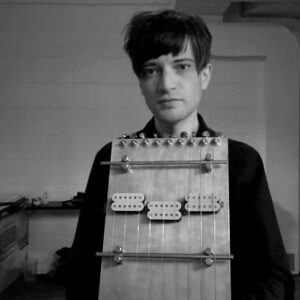Music Technology Major, Bachelor of Arts (BA)
The Bachelor of Arts in Music Technology is designed for students who aim to succeed as creative practitioners, entrepreneurs, performers, composers, songwriters, sound artists, audio engineers, and producers in the music industry. This program presents a contemporary curriculum that addresses the dynamic and changing landscape of the music profession. To provide relevant training in these emerging fields, this degree also includes courses from Design and Business. Advancements in technology impact how music is performed, consumed, produced, and marketed. This program provides an abundance of opportunity for trained experts to garner a lucrative career through this unique, non-traditional field of study.
BA-MUTE Entrance Requirements: This program admission process is holistic and inclusive. Prospective students are required to participate in a brief interview with one of the faculty representatives to discuss goals, aspirations, and what students will bring to the program. Students should demonstrate basic competencies in reading music before taking the music theory class sequence in their first year of the program. Prospective students may also showcase their skills in areas such as: electronic music performance, audio production, sound design, live looping, sampling, synthesis, and composition. Students who play an instrument(s) may also audition for a scholarship and participate in any of our many ensembles.
Note: To support daily use and installation of required audio software, students enrolled in the Music Technology program must have access to a MacBook or Windows laptop.
Minimum Operating System Requirements (Mac): OS 11.0 or later, 8+ GB RAM
Minimum Operating System Requirements (Windows): 10 version 22H2 or later (Not 11S), 8+ GB RAM
World Language Requirement: Two years of a single high school world language or one year of a single college-level world language is required.
Grade Requirement for all majors offered by the Music Department: the minimum acceptable grade for any music course required for graduation (including transferred music courses) is ≥C.
| CONVOCATION AND RECITAL ATTENDANCE (must be repeated each term) | |
&
& | MUSIC THEORY I
and MUSIC THEORY II
and MUSIC THEORY III | 9 |
&
& | AURAL SKILLS
and AURAL SKILLS II
and AURAL SKILLS III | 3 |
| PIANO CLASS I BEGIN/NON-MAJORS (Based on audition students will take either MUSC 117 OR MUSC 120) | 1 |
| or | PIANO CLASS I FOR MAJORS |
| STUDIO AS INSTRUMENT - COMPOSING WITH ELECTRONIC MEDIA | 2 |
& | SOUND RECORDING ARTS I
and SOUND RECORDING ARTS II | 6 |
| LIVE SOUND | 3 |
| SOUND FOR INTERMEDIA PRODUCTIONS | 3 |
| DATA-TO-MUSIC SONIFICATION | 3 |
| 3-D AUDIO | 3 |
| SOUND SPACES | 3 |
| CREATIVE CODING IN MAX/MSP | 3 |
& | AUDIO ENGINEERING AURAL SKILLS
and AUDIO MASTERING TECHNIQUES | 6 |
| CASE STUDIES IN MUSIC INDUSTRY | 3 |
| MUSIC COMMUNITY ENGAGEMENT | 2 |
| DIGITAL SOUND | 5 |
| BUSINESS STARTUP RESEARCH | 4 |
| THE ENTREPRENEURIAL EXPERIENCE | 4 |
| BUSINESS FEASIBILITY: PLAN AND PITCH | 4 |
| COMMERCIAL VOICE LESSON | |
| INSTRUCTION ON VOICE OR INSTRUMENT | |
| COMPOSITIONAL TECHNIQUES | |
| AMERICAN POPULAR MUSIC: 1920 AND BEYOND | |
| SONG WRITING | |
| MARCHING BAND | |
| WIND ENSEMBLE | |
| ORCHESTRA | |
| SYMPHONIC CHOIR | |
| CONCERT CHOIR | |
| CHAMBER MUSIC ENSEMBLES | |
| MUSIC SENIOR CAPSTONE | 4 |
| Total Credits | 80 |
The following plan of study is for a student with zero credits. Individual students may have different factors such as: credit through transfer work, Advanced Placement, Running Start, or any other type of college-level coursework that requires an individual plan.
Courses could be offered in different terms, checking the academic schedule is paramount in keeping an individual plan current. Students should connect with their music advisor to ensure they are on track to graduate.
All Undergraduate students are required to meet the Undergraduate Degree Requirements.
This major requires the completion of the World Language requirement. Students pursuing a Bachelor of Arts (BA) degree must complete two years of a single language in high school or one year of a single language in college.
| First Year |
|---|
| Fall Quarter | Credits | Winter Quarter | Credits | Spring Quarter | Credits |
|---|
| 5 | | 5 | | 3 |
| 3 | | 5 | | 1 |
| 1 | | 3 | | 0 |
| 0 | | 1 | Humanities & Arts BACR 21 | 5 |
| or | 1 | | 0 | Social Science BACR 11 | 5 |
| Humanities & Arts BACR 11 | 5 | | 2 | |
| | 15 | | 16 | | 14 |
| Second Year |
|---|
| Fall Quarter | Credits | Winter Quarter | Credits | Spring Quarter | Credits |
|---|
| 0 | | 0 | | 5 |
| 3 | | 3 | | 0 |
| 3 | Music Technology Elective2 | 1 | | 3 |
| Music Technology Elective2 | 1 | Natural Science BACR 21 | 5 | | 3 |
| Natural Science BACR 11 | 5 | Elective - minor or general elective | 5 | Music Technology Elective2 | 1 |
| Social Science BACR 21 | 5 | | Global Studies - graduation requirement1 | 5 |
| | 17 | | 14 | | 17 |
| Third Year |
|---|
| Fall Quarter | Credits | Winter Quarter | Credits | Spring Quarter | Credits |
|---|
| 4 | | 4 | | 4 |
| 0 | | 0 | | 0 |
| 3 | | 3 | | 3 |
| Diversity - graduation requirement1 | 5 | Music Technology Elective2 | 1 | Music Technology Elective2 | 1 |
| Elective - minor or general elective | 5 | Elective - minor, or general elective | 5 | Elective - minor or general elective | 5 |
| | | Elective - minor or general elective | 2 |
| | 17 | | 13 | | 15 |
| Fourth Year |
|---|
| Fall Quarter | Credits | Winter Quarter | Credits | Spring Quarter | Credits |
|---|
| 0 | | 0 | | 0 |
| 3 | | 3 | | 3 |
| Music Technology Elective2 | 2 | (Senior Capstone - graduation requirement) | 4 | | 2 |
| Elective - minor or general elective | 5 | Music Technology Elective2 | 1 | Music Technology Elective2 | 1 |
| Elective - minor or general elective | 5 | Elective - minor or general elective | 5 | Elective - minor or general elective | 5 |
| | Elective - minor or general elective | 1 | Elective - minor or general elective | 2 |
| | 15 | | 14 | | 13 |
| Total Credits 180 |
University Competencies and Proficiencies
English
Quantitative and Symbolic Reasoning
Placement and Clearance
Prior Learning/Sources of Credit AP, CLEP, IB
General Education Requirements (GER)
- Minimum Credits—180 cumulative credit hours
- 60 upper-division credits (300 level or above)
- 45 credits in residence (attendance) at Eastern, with at least 15 upper-division credits in major in residence at Eastern
- Minimum Cumulative GPA ≥2.0
Breadth Area Core Requirements (BACR)
Humanities and Arts
Natural Sciences
Social Sciences
University Graduation Requirements (UGR)
Diversity Course List
World Language (for Bachelor of Arts)
Global Studies Course List
Minor or Certificate
Senior Capstone Course List
Application for Graduation (use EagleNET) must be made at least two terms in advance of the term expected to graduate (undergraduate and post-baccalaureate).
Use the Catalog Archives to determine two important catalog years.
- The catalog in effect at the student's first term of current matriculation is used to determine BACR (Breadth Area Core Requirements) and UGR (Undergraduate Graduation Requirements).
- The catalog in effect at the time the student declares a major or minor is used to determine the program requirements.
Students who earn a BA in Music Technology from EWU should be able to:
- demonstrate basic competency in music theory through score reading and analysis;
- create works/productions from music technologies through completion of recording projects;
- design sound-processing tools and new instrument sounds through research and development projects;
- demonstrate knowledge of the fundamental challenges faced by entrepreneurs, and the tools that help them plan for success;
- demonstrate competency with sound recording and editing tools;
- design new instruments through research and development projects;
- work in teams to solve problems.










